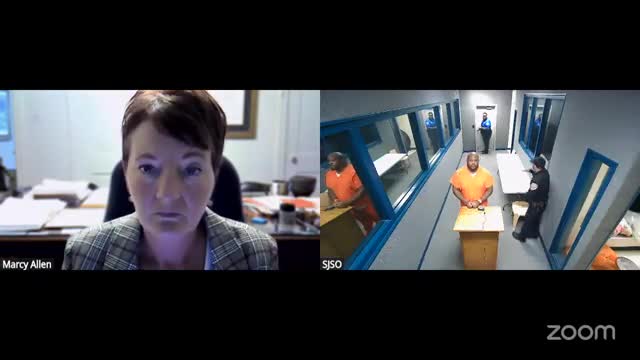Parole panel revokes two cases, denies several and issues conditional releases tied to treatment
Get AI-powered insights, summaries, and transcripts
Subscribe
Summary
The Louisiana Committee on Parole met Nov. 6, 2025, and issued a series of custody and parole decisions: two inmates had parole revoked, several parole requests were denied, one inmate was directed into residential treatment instead of revocation, and two inmates received conditional grants dependent on completion of long-term substance-abuse treatment and victim-related programming.
The Louisiana Committee on Parole, chaired by Cheryl Renanza, met Nov. 6, 2025, to consider multiple revocation and parole-review matters from parish jails and state correctional centers. After testimony from inmates, counsel, victims and facility staff, the three-member panel issued a mix of revocations, denials and conditional grants tied chiefly to long-term substance-abuse treatment and compliance with victim- and residence-related conditions.
Why it matters: The paneldecisions affect immediate custody for inmates accused of parole violations and set conditions that determine whether several inmates will be eligible for supervised reentry. Several rulings required completion of specific DOC treatment programs or reentry-provider supervision before release.
What the panel decided (high-level): - Revoke: Antonio Bryce (DOC 608884) and Deman Butler (DOC 491750) were revoked after the panel found violations of parole conditions including criminal activity and, in Bryce's case, guilty/no-contest plea records for domestic-related offenses. Chair Renanza announced the revocations and the panel advised each inmate of the procedure to apply for reparole.
- Treatment in lieu of revocation: Darren Levine (DOC 751591) was recommended for placement in the Steve Hall long-term substance-abuse program and domestic-abuse classes, with a no-contact restriction for the named victim; the panel explicitly set this as an alternative to revocation.
- Deny parole: The panel denied parole for Edward Jones (assigned to Hunt Special Unit for chronic psychiatric care), Patrick Parker (significant victim opposition and outstanding rehabilitation steps), Javier Morales (recent convictions and program backlogs), and Johnny Jamia Williams (program backlog and need for treatment). The panel cited ongoing treatment needs, victim opposition, or insufficient participation in required programs as reasons for denial.
- Conditional grant: William Coleman (DOC 90578) and Claude (Edward) Roan (DOC 555926) received conditional grants of parole contingent on completion of specified long-term DOC substance-abuse treatment (Steve Hall or DOC-equivalent as listed by the panel), completion of victim-accountability programming and approved residence plans; Coleman was also ordered to a year of reentry-provider supervision with random drug testing and a nightly curfew.
Panel procedure and evidence: For each case the panel read alleged parole-condition violations aloud, asked the inmate to enter pleas, accepted exhibits and heard victim impact and character testimony when offered. Counsel in several cases emphasized dismissals by prosecutors in other jurisdictions or argued the presence of permissive text-message permission to travel; the panel noted such materials but in several instances concluded that plea records or guilty/no-contest filings required revocation.
Quotations from the hearing: Chair Cheryl Renanza told Antonio Bryce at the conclusion of his case: "Mister Bryce, today, your parole is being revoked. You will have an opportunity to apply for reparole. We'll send you information on how and when you can do that. Good luck to you, sir." Counsel in the Levine matter urged treatment placement, noting that "the district attorney's office in Kansas decided to drop and dismiss all of the charges" (Marcy Allen speaking for a different case) and the panel used that context when weighing options.
Next steps and follow-up: In revoked cases the Department of Corrections will effect the custody orders and provide information about reparole application windows. For conditional grants, release will be contingent on completing the programs the panel specified and verification of approved residence plans by probation and parole.
What the panel recorded (selected case outcomes): - Antonio Bryce (DOC 608884): parole revoked (panel vote: Renanza=yes; Freeman=yes; Barra=yes). Evidence cited included guilty/no-contest plea records and multiple arrest reports; community supporters testified on his behalf but the panel concluded the plea/record required revocation.
- Deman Butler (DOC 491750): parole revoked after guilty pleas to resisting/battery counts (panel vote: Renanza=yes; Freeman=yes; Barra=yes).
- Darren Levine (DOC 751591): treatment ordered in lieu of revocation; panel recommended Steve Hall program and domestic-abuse classes, with no contact order for the victim (panel concurrence by the three members).
- Edward Jones (DOC 44390): parole denied due to ongoing psychiatric-care needs and strong law-enforcement opposition (unanimous denial).
- Patrick Parker (DOC 3Is5992): parole denied; panel recommended completing victim-accountability and additional substance-abuse programming (unanimous denial).
- William Coleman (DOC 90578): conditional parole granted contingent on completing DOC long-term substance-abuse treatment (Steve Hall or equivalent), victim-impact and letter-writing requirements, one year of community supervision through a reentry provider with outpatient substance-abuse follow-up, curfew and random drug screens (unanimous grant conditioned on terms).
- Javier Morales (DOC 713183): parole denied; panel urged immediate placement into substance-abuse treatment when facility space is available (unanimous denial).
- Johnny Jamia Williams (DOC 481557): parole denied and directed to be placed on program backlogs and prioritized for long-term substance-abuse and trade programming (unanimous denial).
- Claude (Edward) Roan (DOC 555926): parole granted conditionally; requirements include completion of DOC long-term substance-abuse treatment, victim-accountability letter training, an approved residence plan verified by probation and parole, mandatory AA attendance and strict no-contact conditions for the named victims (unanimous grant conditioned on terms).
Sources and materials: The panel relied on pre-hearing memoranda, plea and arrest records, probation/parole officer notes, witness statements and facility reports provided for each docketed case. Where jurisdictional outcomes (dismissals by other prosecutors) were raised, counsel used those records in argument; the panel weighed those arguments alongside plea records and supervision history.
Limitations: This report summarizes the panel actions recorded on Nov. 6, 2025. It does not infer future parole outcomes beyond the conditions the panel imposed. For several cases the panel explicitly tied any future release to completion of DOC programs that are subject to facility backlogs and availability.
